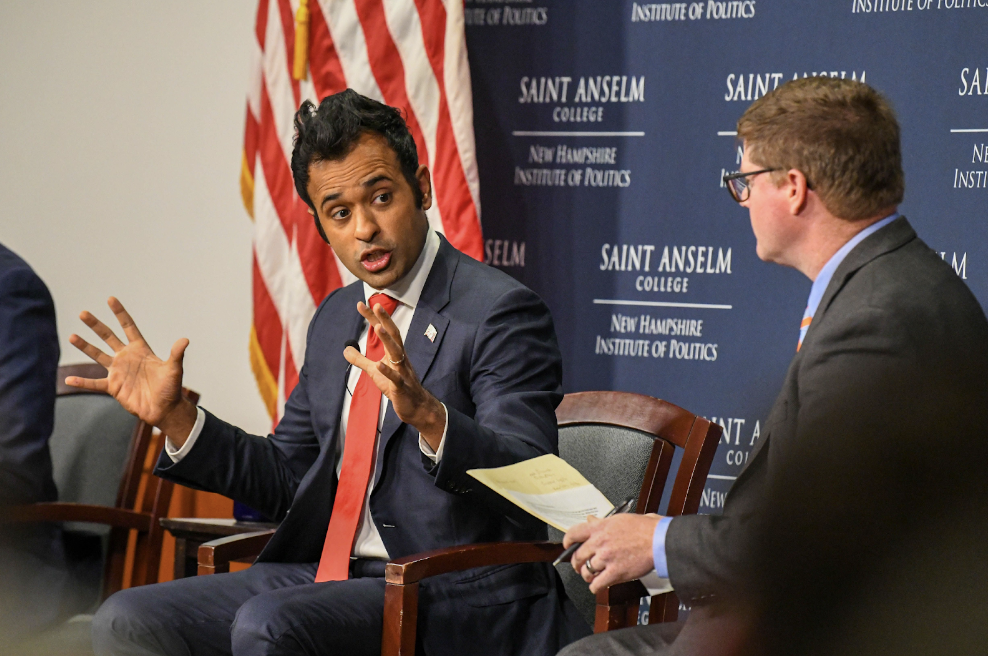Republican presidential candidate Vivek Ramaswamy and Congressman Ro Khana (D-CA) sparred at the Future of America debate hosted by the New Hampshire Institute of Politics.
Ramaswamy and Khana tackled topics including the economy, foreign policy, climate change and the future of American democracy. Both Ramaswamy and Khan showed an eagerness to take part in a forum where respectful and engaging dialogue could take place in a debate setting.
To begin the debate, the moderator, James Pindell of NBC and MSNBC, explained how the forum was unique. The debate consisted of only two participants going back and forth with no follow up questions from the moderator, all with no commercial breaks.
Unlike prior GOP presidential primaries, the Future of America Debate was an opportunity for Ramaswamy and Khana to express their different opinions and views in a free environment.
The debate began with the economy and the effectiveness of Bidenomics. Ramaswamy believes that the statistics coming from the White House that claim that the economy has improved since Biden took office aren’t an indicator of a thriving economy. He cited that many of the jobs created under the Biden administration are recovered jobs from the pandemic. “Prices are up. Interest rates are up. Mortgage rates to buy a new home are going up, but wages are remaining flat. That’s the problem,” Ramaswamy said.
“We need to increase the supply of energy, frack, burn coal, and embrace nuclear energy,” he continued. “The regulations coming from the government take away the incentive for Americans to work. Take the wet blanket off the economy.”
Khana responded by saying, “Yes, 70% of those jobs were recovered, but they were recovered in two and a half years. That’s impressive.” He referenced presidents such as Lincoln and FDR who used the federal government as a tool to rejuvenate the economy, contradicting Ramaswamy’s anti-government approach.
He calls on Congress to reverse the Reagan and Trump tax cuts and invest that $15 trillion and invest it in American industry and manufacturing to help the middle class. “How do I determine the success of our economy? It’s based on how the middle class is doing. They have been shafted for 40 years and the president is finally doing something about that,” Khana said.
Ramaswamy is an outsider to American politics. He founded an asset-management firm based out of Ohio and has been an author and conservative political activist. At 38 years old, he is the youngest candidate in a crowded GOP field. Age has been a hotly debated issue in this election cycle. Both leading candidates, Donald Trump and Joe Biden, would be in their 80’s come their second term. Ramaswamy ahs used his platform to attempt to spark a newfound interest in politics from young Americans.
“I think young people can tell the difference between plastic politicians versus somebody who is actually sharing their true convictions,” Ramaswamy said after the debate. “I will be the one to keep the next generation out of foreign wars. It is the next generation that is going to bear the burdens of the national debt and foreign wars that don’t advance our interests.”
He continued to say that the current generation of politicians don’t take these risks into account “they’re going to be dead and gone by the time we are going to pay the costs of these wars.”
Ramaswamy currently polls fifth in New Hampshire, according to a 538 poll finalized on Nov. 2. He trails Trump, DeSantis, Haley, and Christie, as he comes in at 6.6%. Ramaswamy gained popularity early in the campaign with his ideas that have resembled those of former president Trump and calling him “the best president of the 21st century.”
However, after two lackluster national debate performances, Ramaswamy has found his popularity among Republicans begin to fizzle out. He has not committed to participating in the third GOP debate, although it is assumed he will meet the advanced criteria needed to qualify for participation. Former Vice President Mike Pence suspended bid for the White House last week, becoming the first major candidate to end their campaign.
Ramasaway says he looks forward to continuing his efforts in early voting states like Iowa, Nevada, South Carolina, and New Hampshire.


